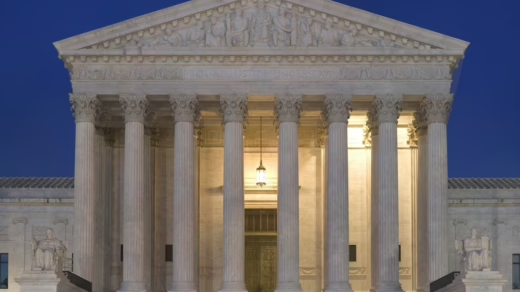Among a torrent of Supreme Court decisions today came one involving a picture book. Well, that’s a little reductive, but also not really. The case, Mahmoud v. Taylor, centered on if a school had to give parents an opportunity to protect their children from such dangerous things as picture books involving LGBT+ themes on the off chance it inhibited the parents’ rights to practice their religion.
Without getting too far into the weeds with regards to the facts of the case, the case involved several families in Montgomery County, Maryland, who argued that the local schools adding books with LBGT+ content to the language-arts curriculum impinged upon their religious rights, specifically as parents. You see, the school district did not offer parents a way to opt their children out of lessons involving the books, even if they cited religious reasons.
You may ask yourself: What’s the big deal with just letting parents opt their kids out of lessons they don’t agree with? Well, that way lies madness. Schools and teachers are already overburdened: allowing anybody to just opt out of whatever they want would just add to the burden. And this cut out would be broad—anything that could be construed as departing from one religious faith could be considered suspect, no matter how tenuous. And teachers would have to inform parents of every single piece of the curriculum, giving them an opportunity to opt out, splitting classrooms among an infinite number of lines. It’s already hard enough to teach one class; forget about teaching 30 individual classes at the same time.
So the families sued the school district. And they lost at most of the federal court levels, basically for the reason that the rationale was weak and the school district had a real burden. But that’s not going to stop our friendly neighborhood SCOTUS.
You see, the decision handed down today, authored by Friend of Blog Samuel Alito, came down on the other side. In the opening he writes:
A government burdens the religious exercise of parents when it requires them to submit their children to instruction that poses “a very real threat of undermining” the religious beliefs and practices that the parents wish to instill. Wisconsin v. Yoder, 406 U. S. 205, 218 (1972).
On a side note, you may be familiar with the old movie poster practice of pulling out a tiny quote from a meh review: showing “wondrous” where the review said “it is wondrous how boring this movie is” or some such. This isn’t that dishonest, but it is a weird and funny use of quotation, and is notably from the case that allowed the Amish to not send their kids to school past the eight grade: “As the record shows, compulsory school attendance to age 16 for Amish children carries with it a very real threat of undermining the Amish community and religious practice as they exist today; they must either abandon belief and be assimilated into society at large or be forced to migrate to some other and more tolerant region.”
I was going to write “anyways,” here, but reading through the decision again, I’m struck that this little snippet is the entire argument. It was largely discarded by the appeals court, because it’s generally accepted that Wisconsin is sui generis, that is to say, the decision really only affects that particular set of facts—that the case and decision really just relate to the Amish as Amish, and wouldn’t be relevant to anybody else. But here we have Alito pulling out a couple of words from it and making it the law of the land.
Tinker is also mentioned (Tinker mentioned!) in that, he writes “the right to free exercise, like other First Amendment rights, is not ‘shed . . . at the schoolhouse gate.’ Tinker v. Des Moines Independent Community School Dist., 393 U. S. 503, 506–507 (1969).” Except, this case is about the parent’s constitutional rights, not the students’! In other words, this is a nonsensical citation.
He also cites Espinoza v. Montana Dept. of Revenue from 2020, but that case also basically hinges totally on the snippet from Wisconsin, so we can just drive by it.
He also helpfully cites himself in the crux of his argument:
Due to financial and other constraints, however, many parents “have no choice but to send their children to a public school.” Morse v. Frederick, 551 U. S. 393, 424 (2007) (ALITO, J., concurring). As a result, the right of parents “to direct the religious upbringing of their” children would be an empty promise if it did not follow those children into the public school classroom. We have thus recognized limits on the government’s ability to interfere with a student’s religious upbringing in a public school setting.
Typical social justice warrior caring about plight of the poors. You see, some religious parents can’t afford some fancy religious school so they have to throw their kids at the Local School for the Poors (public school) and should have the same rights as they would at a religious school (for their kids to be taught religiously).
He then goes on to confuse the rights of the parents and children (citing cases about childrens’ rights) for awhile so we’ll just ignore that. But we’ll get back to the argument at one of my favorite sentences:
Like many books targeted at young children, the books are unmistakably normative.
See, Spot, run? Run, Spot, run! I’m not sure if I got that right but I don’t care. It makes as much sense as this decision. See, most books targeted at young children are unmistakably normative. See Spot? He should be running. Running is good. Dogs should run. Did you learn that, children? I’m not sure he has ever read a children’s book. Most of them are about big red dogs or men in yellow hats.
So anyways what does the presence of LGBT+ characters or concepts in childrens’ books have to do with religious practice? Guess what everybody:
Many Americans “advocate with utmost, sincere conviction that, by divine precepts, same-sex marriage should not be condoned.” Obergefell v. Hodges, 576 U. S. 644, 679 (2015).
You might be wondering: Did this motherfucker just cite Obergefell? Yes, this motherfucker just cited Obergefell. The gay marriage is legal case. In the anti-gay case. This motherfucker.
What’s in the books? Surely some graphic gay sex and furry play? Hmm:
It is significant that this book does not simply refer to same-sex marriage as an existing practice. Instead, it presents acceptance of same-sex marriage as a perspective that should be celebrated. The book’s narrative arc reaches its peak with the actual event of Uncle Bobby’s wedding, which is presented as a joyous event that is met with universal approval.
The horror. I remember the last wedding I went to, it was very much a somber, not joyous event, and was definitely not met with universal approval. Oh wait, that was just a work meeting. I probably shouldn’t have brought a gift.
You may be wondering: are there pictures in this decisions? Oh friend, you know there are. Here’s one:

Totally normative. See it’s not just a gay wedding—it’s an interracial wedding. I wonder which Alito hates more.
So really what we have here is Samuel Alito does not like these books and wants to make sure parents don’t have to let their kids see them. He doesn’t like these books because they, factually, portray gay, lesbian, queer, and trans people as real people existing in and inhabiting the world. See, that is normative. And because, by his reckoning, if a kid sees a book with gays, it means their parents can’t do religion. That’s about as much sense as this decision makes.
Yes, the decision then goes on to the technical details about burdens and scrutinies, but that part is both boring and wrong, so I’m not going to waste either of our time going through it. I’m also not going to highlight the dissent because that’s also pointless. So is this blog post I suppose.
There probably is some room for discussion about how this case fits in to the history of the conservative attack on public education, and how the entirety of conservatism in this country broke their goddamned brains after Brown v. Board, so that might be something we’ll come back to another day.





